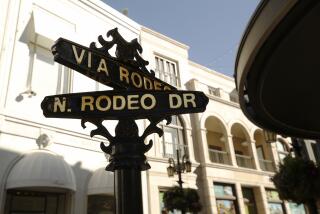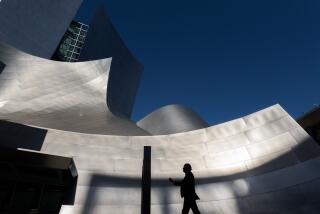Southwestern Law School plans to build student housing
- Share via
Southwestern Law School, which occupies one of Los Angeles’ most famous buildings, has announced plans to expand its quarters with construction of student housing.
The move marks a breakthrough in the evolution of the century-old institution into a law school with an authentic 24-hour campus, officials said.
Southwestern expects to start work in December on a $20-million project to create 133 apartments, an outdoor courtyard and underground parking next to the school’s two main buildings.
“What we are going to do now is transform the campus,” said Bryant G. Garth, Southwestern’s dean. “Think about it now as an urban campus that’s going to look like a small liberal arts college.”
Southwestern took the first step toward that goal in 1994 with its purchase of the former Bullocks Wilshire department store on Wilshire Boulevard. The building, declared a “cathedral of commerce” when it opened in 1929, is considered an Art Deco masterpiece and is listed on the National Register of Historic Places.
Southwestern spent $10 million restoring Bullocks and adapting the building for school uses while preserving numerous built-in artworks and fixtures. It secured the closure of part of Westmoreland Avenue, the street between Bullocks and a six-story office building that had been the school’s sole facility since 1974.
In recent years, the school has quietly acquired four adjacent 1920s apartment buildings and a vacant lot for less than $10 million as well as gained control of a Wilshire Boulevard retail building completed in 1939. Those properties, which give Southwestern a real estate footprint of about two city blocks, have yet to be incorporated into the school but are expected to play a part in the future.
Immediate plans call for construction of the new apartment complex on one of the school’s parking lots at Shatto Place and 7th Street. It will be able to house 153 students — about 40% of the school’s typical entering class — when it opens in the fall of 2013.
“All they need to do is check a box and they’ve got a place to stay,” Garth said. “Housing is completely transformative for a law school. Students no longer have to worry about where they are going to live.”
Surveys showed that Southwestern students prefer to live alone while engaged in the demanding pursuit of a law degree and had little interest in a dormitory-style facility, said architect Anthony Stark of Corsini Stark Architects. Only 20 of the new apartments will have two bedrooms.
“They all really wanted to live by themselves,” Stark said, and they want peace and quiet. “Acoustics were really important.”
The building design does include social gathering areas inside and out, he said, but is more committed to meeting students’ desire for modern technology and environmental sustainability than saluting the architectural glory of Bullocks.
“We took some architectural clues from buildings around Wilshire,” he said, such as using stone around the base. “We’re not trying to mimic Bullocks.”
Southwestern’s consultant on the building project is Symphony Development, a Los Angeles company that helped develop the $55-million West 27th Place luxury student complex that opened this year near USC.
Southwestern isn’t as well known outside of legal circles as other law schools, but the creation of a proper campus should give it a wider presence, said attorney Katrina Dewey, chief executive of the legal news service Lawdragon.
“Loyola and USC have been the best feeders to the Southern California legal community,” she said. “This is a statement that Southwestern is upping its game and joining them.”
The purchase of Bullocks Wilshire and subsequent growth of the campus can be credited in part to its graduates, Dewey said.
“Southwestern doesn’t have a football team or basketball team, but they do have a great network of alumni who contribute, and obviously this expansion is a tribute to that.”
More to Read
Inside the business of entertainment
The Wide Shot brings you news, analysis and insights on everything from streaming wars to production — and what it all means for the future.
You may occasionally receive promotional content from the Los Angeles Times.











